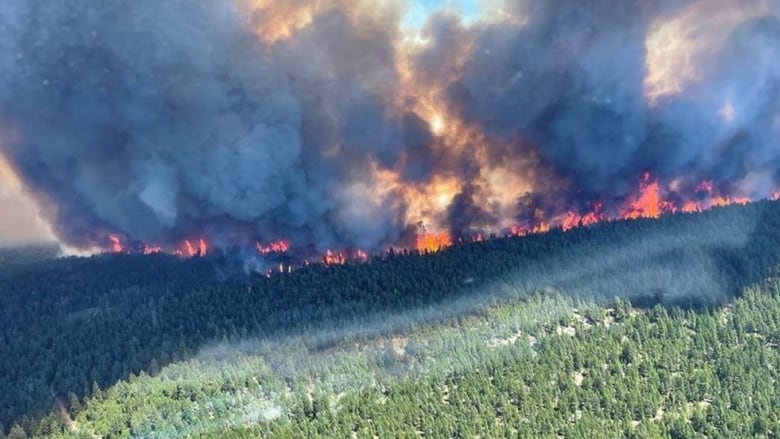Feds vow military support as B.C. continues to battle more than 100 active fires
Officials are expecting more than 70 new fires in the coming days

As BCWildfire Servicecrewscontinue to fight more than100activewildfires acrossthe province,the federal government isvowingto provide any additional support needed in fighting the blazes.
In a newsconference Friday evening, Canada's public safety minister announced Ottawa iscurrently co-ordinating with the B.C.government tomobilizemilitary support to help where needed.
Defence MinisterHarjitSajjansaid a base will be positioned in Edmonton to provide aviation resources and up to 350 military personnelto help fight the fires.
"If needed, it can be used to support evacuations,firefightersand residents from the communities," Sajjan said.
He also said themilitary resources will be helpful in providing assistance as the province continues to respond to more fires throughout the summer.
Fires of note across B.C.
Meanwhile, as hundredsof residents in B.C. anxiously prepared to leave their homesat a moment's notice, BC Wildfire Service says they arebracingfor more fires to be sparkedthroughout the weekend.
According to the director of provincial operations for BC Wildfire Service, out of 168active wildfires, nine of them are currently of note,with the Sparks Lake firenear Kamloopsbeing the most concerning. Located about 15 kilometres north of Kamloops Lake, the fire is classified as out of control and is estimated at 310 square kilometres.
"We saw 12,000lightning strikes, roughly, yesterday," said Cliff Chapman."Many of those lightning strikes were hitting near communities, [as] was seen in the Kamloops area."
On Friday night, a wildfirejust outside the city, near Durand Lake, caused an evacuation of 71 properties. Earlier in the day,Kamloops announced it wasreactivatingits Emergency Operations Centre in support of multiple fires flaring up in the area.
On Thursday night, a wildfire near the city's Juniper Ridge neighbourhood triggered an evacuation order for some 200 residents. Crews managed to tame the fire and keep it under control Friday, eventually rescindingthe order and allowing residents to return home.
Some people have said they were already prepared to leave, even before the evacuation order, as the tragedy in Lytton, B.C.,is still fresh in their minds.
WATCH | Lytton destroyed by wildfire:
"Yesterday morning I had gathered all of our special documents two days prior," a Juniper Ridge resident told CBCNews.
In a statement,Kamloops Fire Chief Steve Robinson said the efforts of firefighters saved an estimated 400 homes.
"An absolute near-miss," another Juniper Ridge homeowner said, as they recountedwitnessing the wildfire only 300 metres away from the neighbourhood.
Chapman said more than1,300 homes are currently under the evacuation order as of Friday and another 950 are under alert.
Wildfire support is currently working with the federal government and Canadian militaryfor additional support and aviation resources, he said.
More fires expected
Chapman said hot, dry conditions, along with thunderstorms, are causing some wildfires in the southeast Interior of the province to grow quickly,which promptedan early start to the 2021 fire season.
"We are three weeks ahead of our drying cycle," he said. "For comparison sake, in 2017, which was another devastating year for the province and wildfires, the fires didn't start until July 7 and we didn't hit that 100,000-hectare mark until mid-July."
He said there were 70 new confirmed fires in the southeast region of the province throughout Thursday evening and officials were expecting just as many on Friday evening and into the weekend.
There are fires near Lillooet, 100 Mile House, Buckinghorse River and several small communities in the Cariboo, but the closest blaze to a major city was the Merry Creek fire, burning nearCastlegar, home to about8,000 people.
Officials are also keeping a close watch on the Deka Lake fire, estimated at 200 hectares (two square kilometres).

The fires near Lytton haveclosed Highway 1 inboth directions north of Hope toSpences Bridge. Drivers are being asked to avoid this area to support firefighting operations.
Highway 3 is also closed in both directions, according to DriveBC, as crews battle theMerry Creek wildfire between Highway 3B and Crestview Crescent.
Meanwhile campers at Green Lake Provincial Park in the Cariboo are being asked to leave immediately as the Sparks Lake fire continues to grow and threaten the area.
Extreme weather intensifying
Climate scientists are cautiousabout citing climate change as the cause of any specific weather event,such as the current heat wave in British Columbia. But some say evidence suggests extreme events are intensifying and becoming more common because of global warming.
A 2019 report commissioned by Environment and Climate Change Canada found the countryiswarming twice as fastas the global average,with the highest rates occurring in the North, the Prairies and northern B.C.Temperatures in the Arctic areincreasing at three timesthe global rate.
Jet streams, meanwhile, which essentially move weather patterns, are stalling much longer due to the shrinking temperature difference between the Arctic and mid-latitudes, according to CBC meteorologist Johanna Wagstaffe.
"You get great [heat] waves, like what's happening over B.C., that stick around for longer," she said.
Anyone placed under an evacuation order must leave the area immediately.
Evacuation centres have been set up in the following locations to assist anyone evacuating from a community under threat from a wildfire:
- Castlegar: Castlegar Community Complex, 2102 6th Ave.
- Chilliwack: Chilliwack Senior Secondary, 46363 Yale Rd.
- Kelowna: Salvation Army, 1480 Sutherland Ave.
- Merritt: Merritt Civic Centre, 1950 Mamette Ave.
Evacuees are encouraged to register withEmergency Support Servicesonline, whether or not they access services at an evacuation centre.
Those looking for loved ones can contact the Canadian Red Cross for family reunification services at 1-800-863-6582
With files from The Canadian Press and BC Today













_(720p).jpg)


 OFFICIAL HD MUSIC VIDEO.jpg)
.jpg)



























































































